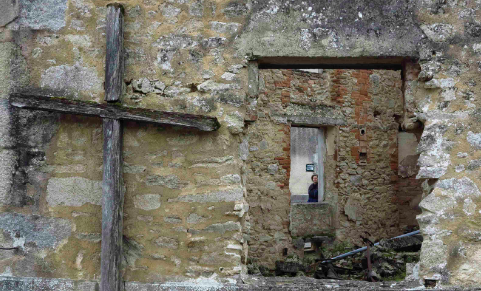September 13 | ![]() 0 COMMENTS
0 COMMENTS ![]() print
print

Forgiving the unforgivable: a horrific WWII massacre and the lessons it teaches on reconciliation
Ross Ahlfeld explores a WWII massacre where Nazis destroyed a French village, killing 642 people, and how Pax Christi helped mend a post-war Europe.
Earlier this year, Terrence Mallick’s newest film A Hidden Life had its world premiere at the Cannes film festival. The film concerns the life Blessed Franz Jägerstätter, the Austrian conscientious objector who was executed by the Nazis and later declared a martyr and beatified by the Church.
Blessed Franz Jägerstätter is an important figure within the Catholic peace movement. For example, every Good Friday, Glasgow Catholic Workers uses a wonderful little booklet of prayer and reflections taken from the writings of Blessed Franz Jägerstätter during their Way of the Cross through the streets of Glasgow city centre.
At every station, each member of the procession takes it in turns to recite a few words from the booklet, which uses text supplied by Pax Christi with reflections written by Blessed Franz Jägerstätter.
Pax Christi
Pax Christi is an international Catholic peace movement, and last month a Scottish branch of the organisation became an approved member of the international committee.
The work ahead of them will not be easy: the undertaking of any effort to atone and reconcile takes time. It is often painful and exhausting work for all those involved, and, as Blessed Franz Jägerstätter could testify to, this is especially true of the struggle to heal the wounds of war.
Indeed, some would say that achieving complete repentance and full forgiveness is sometimes impossible because some sins are just too hard for us to forgive.
Reconciliation
The founders of Pax Christi have plenty of experience of this difficult reality, having spent the years following the Second World War devoting themselves to reconciliation between French and German people.
On June 10 1944, the village of Oradour-sur-Glane was completely destroyed when 642 villagers, including women and children were massacred by the SS. The church where the women and children were burnt to death and the rest of the buildings were never rebuilt, because President de Gaulle ordered that the ruins be maintained as a permanent memorial and museum.
Then, in 1955, Fr Manfred Hörhammer, the first secretary of the German Branch of Pax Christi, visited Oradour. After the visit, Fr Hörhammer, along with the Pax Christi President Joseph Schroffer, Bishop of Eichstätt, gifted a communion chalice (on behalf of Pax Christi Germany), to Pierre Marie Theas, the Bishop of Lourdes and also the founder of Pax Christi, as a symbolic gesture of atonement and reconciliation.
Bishop of Limoges
The chalice was then passed to the Bishop of Limoges who then in turn presented it to the parish of Oradour but the gift was refused.
In the decades that followed, the chalice was rejected again and again by the parishioners of Oradour numerous times.
The understandable bitterness and resentment towards the Germans was just too raw, and it seemed that no amount of symbolic cups, crosses, Masses, wreaths or gestures could atone for the horrific war crimes suffered by the people of Oradour.
Blood of Christ
Eventually in 1988, the chalice was finally accepted by the congregation, but for Bishop Pierre Marie Theas, this communion cup had become symbolic of a pain and division which only God could heal. “This crime can only be redeemed through the blood of Christ,” he would later say.
Rabbi Jonathan Sacks describes the painful process of forgiveness as a series of small steps in the long journey towards redemption. In his wonderful book The Dignity of Difference, Rabbi Sacks writes: “Forgiveness does not mean forgetting, nor does it mean abandoning the claims of justice. It does mean, however, an acknowledgement that the past is past and must not be allowed to cast its shadow over the future.”
Today, Pax Christi’s vital work of reconciliation continues despite being born from a desire to heal the wounds of post-war Europe. These days, Pax Christi’s focus is very much on building a better future where human rights are respected, injustice is challenged and alternatives to violence and war are created. They do this through developing solidarity and the training of faithful peacemakers through various education programmes.
Empowerment
Alongside prayer, this special emphasis on education and action was very much at the heart of Fr Manfred’s vision for the future of Pax Christi: the ability to empower the citizens of all nations to resist and respond appropriately to the propaganda and lies of war.
Yet, it’s not all about the past. These are exciting times for all of us involved in the newly established Pax Christi Scotland which has recently received formal recognition and approval from Pax Christi International.
Over the next few months, with support and guidance from Justice and Peace Scotland and the Conforti centre in Coatbridge, its hoped that all those currently affiliated to the London-based Pax Christi UK will be contacted and invited to become members of Pax Christi Scotland.
It’s also hoped that the newest branch of our Pax Christi global family will also attract brand new members, alongside its existing members in Scotland who belonged to the previous Pax Christi UK arrangement.
Scottish movement
There’s certainly no doubting the fact that new activists will be needed for this vitally important work if Pax Christi Scotland is going to take off, and it is also abundantly clear that we do need a Pax Christi here in Scotland.
We need Pax Christi to be in our schools, universities, workplaces and parishes to nurture a great number of young Christian peacemakers who can work against the gathering forces of destruction and war which we see growing like a shadow across the land.
We need it, more than ever, to resist the rising tide of xenophobic nationalism which scandalises our identity as brother and sisters in Christ and shatters our unity, blinding us to the reality of our true identity as the beloved sons and daughters of God.
In 1995 St Pope John Paul II addressed Pax Christi on its 50th anniversary, telling those gathered: “During the days just before Pentecost, the first Christian community gathered with the Virgin Mary in prayer and received the gift of peace.”
Today this gift of peace is part of our own evangelising mission—and there’s much work still to be done. The time for Pax Christi Scotland has come. To quote Pope John Paul again: “Rise, let us be on our way!”










